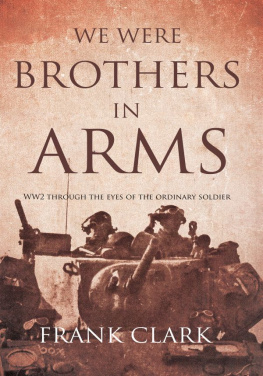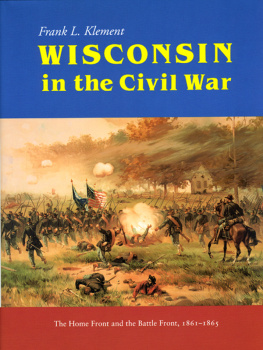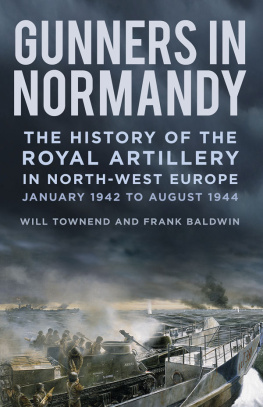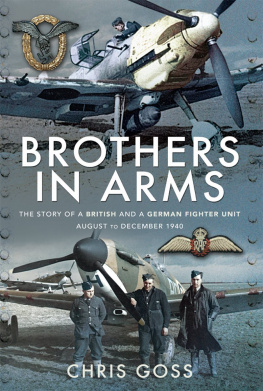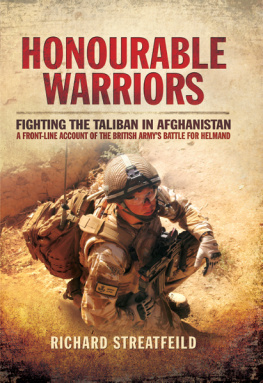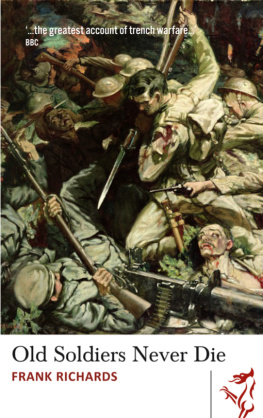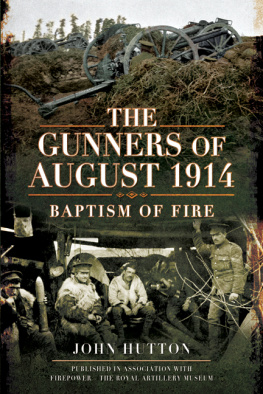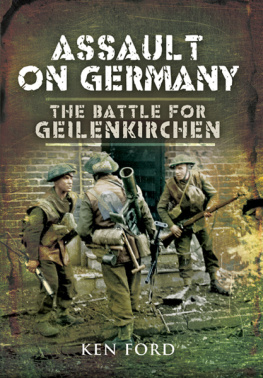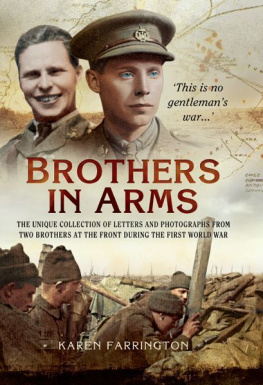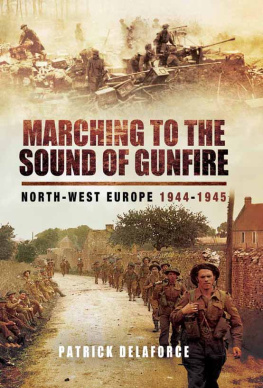Copyright 2013 Frank Clark
The moral right of the author has been asserted.
Apart from any fair dealing for the purposes of research or private study, or criticism or review, as permitted under the Copyright, Designs and Patents Act 1988, this publication may only be reproduced, stored or transmitted, in any form or by any means, with the prior permission in writing of the publishers, or in the case of reprographic reproduction in accordance with the terms of licences issued by the Copyright Licensing Agency. Enquiries concerning reproduction outside those terms should be sent to the publishers.
Matador
9 Priory Business Park
Kibworth Beauchamp
Leicestershire LE8 0RX, UK
Tel: (+44) 116 279 2299
Fax: (+44) 116 279 2277
Email:
Web: www.troubador.co.uk/matador
ISBN 9781783067589
British Library Cataloguing in Publication Data.
A catalogue record for this book is available from the British Library.

Matador is an imprint of Troubador Publishing Ltd

The Author, 1944
We were Brothers in Arms. Major Frank Clark.
As President of the Grenadier Guards Association in our centenary year and founder member of the Colonels Fund Committee of the Grenadier Guards; it was a great pleasure to be invited by Frank Clark to write an endorsement of his book We were Brothers in Arms. All the proceeds from the publication of the book will go to the Colonels Fund.
In his profoundly modest style, Frank describes his part as the thread of my personal experience from which hang the many stories of those who witnessed the events that changed the course of a World War and gave us the freedom that we all enjoy today. Regimentally, from September 1939 to Dunkirk in June 1940, the 1st, 2nd and 3rd Battalions were deployed into France and the Low Countries, withdrawing through Dunkirk with incident, but great honour. The 4th Battalion, introducing Armoured Grenadiers into the Regiments capabilities was raised in September 1940; the 5th and 6th Battalions a little later in August 1941.
By February 1943 the 3rd, 5th and 6th Battalions were in the Middle East moving eventually towards Italy from August 1943. The 1st, 2nd and 4th Battalions were training and preparing for what Frank so aptly describes as a major change in strategy and mission: Defeating Hitler. It is here that Franks thread begins. Following his father into the Grenadier Guards, his real war began soon after June 6th 1944 and D-Day. Frank marshals us through the complexities of Operation Goodwood, the largest tank battle thus far in the campaign for North-West Europe; from Tommy Cookers to tactical intelligence and on to close quarter battles in the Bocage. Frank was in the recce troop in light Stuart tanks, of the 2nd Battalion part of the 6th Guards Tank Brigade and received his battle inoculation during operation Goodwood and Blue Coat in the Bocage, a prelude to the dramatic break out on August 1st 1944, the Guards Armoured Division racing across France to Brussels, made so memorable by the high spirited arrival in that city.
On to Market Garden and the bloody battle for Hells Highway and, just as the balance seemed to be in favour of the Allies, the great German offensive in the Ardennes, known as the Battle of the Bulge. The battle of Geilenkirchen was a hard fought prelude, challenging actions at Battalion level and below. Battles for the lower Rhine bridgehead and the crossing of the Rhine in March 1945 saw Franks now tattered and blood stained thread crossing the Rhine. Der Gotterdammerung the twilight of the gods, surely the end of the Nazi era - but the last days of active fighting were perilous as the Germans were desperate to prevent the Allies from capturing the Rhineland. The liberation of a concentration camp, Frank was in Sergeant Woods 2 tank patrol behind enemy lines when he won the DCM. Frank was injured by a mine and his friend in a neighbouring Stuart was also blown up on a mine, lost his legs and bled to death; a major motive for him supporting the Colonels Fund, now. Victory in Europe Day was declared on the 8th of May 1945, at last.
The family of the Grenadiers is as challenged now by our recent operational tours to Afghanistan as at the time of We were Brothers in Arms. The Colonels Fund Grenadier Guards is designed to support, alleviate and improve the prospects of all those Grenadiers and their families subsequently in need. Specifically it will:
a. Support the families of those killed in action by promptly responding to problems of bereavement and hardship.
b. Support those wounded or injured on operations particularly those who have had to leave the Army; to assist in finding them new employment and to help them become active family and community members.
c. Support the families of those seriously wounded or injured where recovery is prolonged.
We can confidently predict that there will be a marked increase in the number of welfare cases over the medium to long term and that we will be unable to resource them properly from our existing charitable funds, which are fully committed. Frank Clarks determination to present all profits from the publication and sale of We were Brothers in Arms to the Colonels Fund Grenadier Guards, is an inspiration to us all.
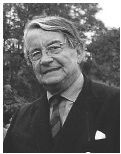
Colonel E. H. Houstoun OBE
President
Grenadier Guards Association.
War brings a terrible cost in terror and revulsion. The privations and sufferings born by the individual common solider are often overlooked and forgotten. In the British Army the total death rate among all soldiers in World War One was horrific. The same was repeated in World War Two, the most destructive conflict in human history. Those poor devils who died are at peace. Those who survived frequently lived in torment. My uncle, Bob, a veteran of the First World War, lived his life out in a lunatic asylum being chased in his mind by Germans. This was before the changing attitudes to war neurosis.
In this book I want to examine the predicament of the individual soldier on the battlefield from their own correspondence. As a rough and ready professional soldier myself, I served through WWII, followed by a brief spell in Korea, then five years jungle warfare on two tours in Malaya fighting terrorists. Then followed civil strife in Cyprus and Northern Ireland, and those terrible years the Cold War when we servicemen practised for a war that could start at any moment and destroy all of us, where we practised for battle wearing protective clothing: charcoal-lined suits with hoods and respirator (gas mask); rubber to save a man from nuclear radiation and lethal gas. We wore rubber gloves and boots. Once we donned anti-chemical suits we were increasingly isolated. The lenses of our masks fogged up and we couldnt see, and we couldnt feel our bodies. We could not hear, only the pounding of our own heart. Was this not a situation to make us more vulnerable to psychological breakdown? A study by Professor Gabriel of the United States Army stated that, after four hours in a chemical suit, a soldiers fighting efficiency was reduced by 60 per cent. We spent days dressed in our chemical suits on exercise facing the Eastern bloc. But that was in the future.
When World War Two started I was too young to join the army. It made no difference. I developed into a man under the Battle of Britain and the Blitz in the night skies. So, to start at the beginning, I have proved I have some understanding of the risks, both mental and physical that the serviceman faces. How does he find the means to suppress his fear in the moment of utmost danger? What drives a man on when all appears lost? I know the totality of fear is often subdued by the importance of male honour, comradeship, team spirit and of the love of the regiment, not to forget national pride, to bolster oneself against fears.
Next page
